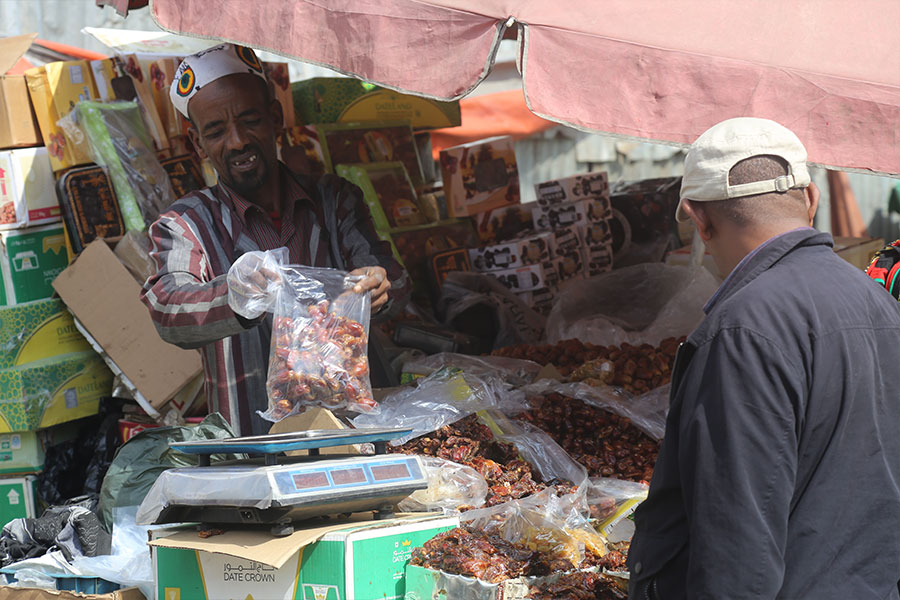
Commentaries | Aug 05,2023
Mar 13 , 2021
By FASIKA TADESSE ( FORTUNE STAFF WRITER )
The statistical agency's latest data indicated that the average price change of goods and services in February grew by 20.6pc. The report comes as the cost of living rises following the never-ending increase in the prices of food items and other commodities.
The consumer price index (CPI) from the Central Statistical Agency indicated that Ethiopia’s inflation pace last month only increased by 1.4 percentage points from the previous month. However, the prices of most items in the market skyrocketed, exerting pressure on consumers.
Unlike in previous months, the food inflation growth rate last month slowed down slightly by 0.3 percentage points to 22.8pc, according to the Agency. Usually, food inflation is behind the accelerating headline inflation.
Price escalation of cereal products hastens food inflation, according to the report from the Agency. Vegetables and pulses types; sugar; edible oil; spices, mainly pepper; potatoes; and coffee have contributed to an increase in the rate of inflation, it indicated.
The non-food inflation showed a rapid growth rate of 18pc due to a rise in the prices of alcohol and tobacco; khat; clothing and footwear; housing repair and maintenance; firewood and charcoal; medical care; transport; fuel; and gold.
The month-on-month general CPI for February, which measures the price change between the two most recent months, has increased by four percent compared to January.
The average change in the price for a basket of goods and services that consumers purchase has been hovering in two-digit rate territory for the past 15 years, far higher than the government's single-digit target. For the current fiscal year, the government aims to confine the rate to 9.5pc. However, the lowest rate registered so far this fiscal year was 18.2pc in December.
Inflation is coupled with seasonal and fast price hikes leading to the rise in the cost of living, according to Wassihun Belay, an independent economist.
"Due to this, people adjusted their consumption and started to consume basic and specific commodities," he said. "This upshot a sudden and drastic price spike of some basic commodities such as teffand red pepper."
Wassihun also recommends the Agency release data that is very specific and includes figures that show which time has shown a price rise and at what rate.
Eyob Tekalign (PhD), state minister for Finance, stated that the country is facing accumulated inflation that has been racking up over the past 10 to 15 years.
“There was capital accumulation due to massive state investments,” said Eyob, who added that the government has launched a three-year programme, the Homegrown Economic Reform Agenda, to address these problems.
Modernising the monetary policy framework, lessening the debt stress, and working on local production are among the solutions that have been under implementation to address the macroeconomic imbalances, according to Eyob, who says achieving these will take time since inflation and the problems have accumulated for years.
As an immediate intervention to stabilise the market, the government is pursuing a speedy procurement process for major consumer commodities through state-owned enterprises, according to Eyob.
Two months ago, the government formed a 16-member economic advisory council that is expected to be a regular source of independent, objective and evidence-based advice on the government's economic policy. The recently launched 10-Year Perspective Plan also targets to confine the inflation rate to 7.2pc in the coming decade through fiscal and monetary policies.
The authorities should develop a culture of going out and informing the people what causes the inflation and how they are planning to address it, said Wassihun.
PUBLISHED ON
Mar 13,2021 [ VOL
21 , NO
1089]

Commentaries | Aug 05,2023

Agenda | May 20,2023

Commentaries | Apr 06,2024

Radar | Dec 11,2021

Featured | Apr 22,2023

Exclusive Interviews | Jan 24,2023

Fortune News | Apr 13,2024

Viewpoints | Apr 09,2022

Fortune News | Aug 26,2023

Viewpoints | Jun 25,2022

Jul 13 , 2024 . By AKSAH ITALO
Investors who rely on tractors, trucks, and field vehicles for commuting, transportin...

Jul 13 , 2024 . By MUNIR SHEMSU
The cracks in Ethiopia's higher education system were laid bare during a synthesis re...

Jul 13 , 2024 . By AKSAH ITALO
Construction authorities have unveiled a price adjustment implementation manual for s...

Jul 13 , 2024
The banking industry is experiencing a transformative period under the oversight of N...

Jul 20 , 2024
In a volatile economic environment, sudden policy reversals leave businesses reeling...

Jul 13 , 2024
Policymakers are walking a tightrope, struggling to generate growth and create millio...

Jul 7 , 2024
The federal budget has crossed a symbolic threshold, approaching the one trillion Bir...

Jun 29 , 2024
In a spirited bid for autonomy, the National Bank of Ethiopia (NBE), under its younge...